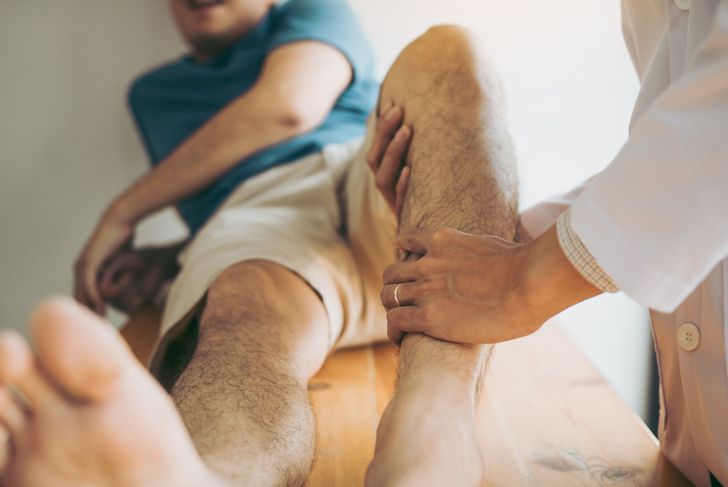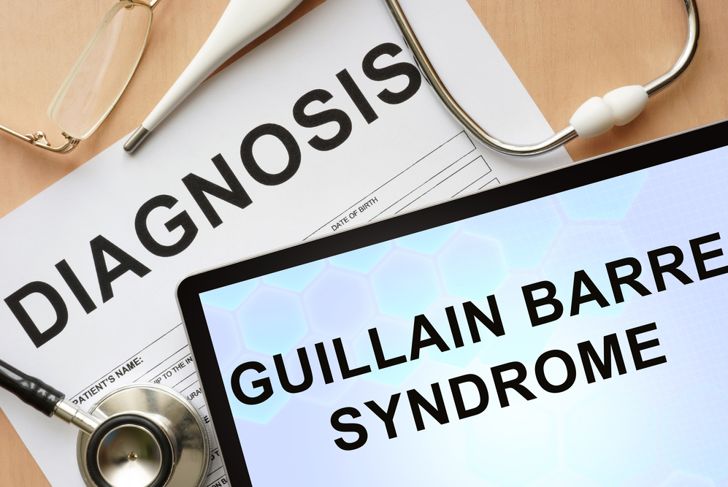Guillain-Barré is a rare neurological condition in which a person’s immune system attacks their peripheral nervous system. The severity of this condition can vary significantly, ranging from mild weakness to complete paralysis. Much remains unknown about Guillain-Barré syndrome, including its direct cause. The condition is manageable, though it can take some time to fully recover.
Symptoms
Guillain-Barré syndrome typically starts with weakness and tingling in the feet and legs that spreads to the upper body. In roughly 10% of people with this condition, the sensations begin in the arms or face. Other symptoms include
- Pins and needles sensation
- Muscle weakness
- Unsteady walking, loss of balance
- Inability to move the facial muscles
- Difficulty talking, chewing, swallowing
- Difficulty breathing
- Loss of bladder and bowel control
- Blood pressure changes, either low or high
- Rapid heart rate
- Severe pain
Types
Though experts once believed Guillain-Barré syndrome to be a single condition, they now recognize several different types. Acute inflammatory demyelinating polyradiculoneuropathy (AIDP) is the most common type in North America and Europe. Its main symptom is weakness originating in the lower body.Miller Fisher syndrome’s characteristic symptoms are eye paralysis and difficulty walking. It is more common in Asia and rarer in North America. Other types include acute motor axonal neuropathy (AMAN) and acute motor-sensory axonal neuropathy (AMSAN), which more frequently appear in Mexico, Japan, and China.
Causes
Guillain-Barré syndrome’s cause remains unknown, though researchers have found links to several potential triggers.Experts know the condition stems from the immune system attacking the nerves, though there is no consensus on the exact mechanisms of this process. It often appears shortly after digestive tract or respiratory infections. Recently, some cases have developed following Zika and COVID-19 virus infections.
Mechanisms
Medical researchers have proposed several ideas to explain how Guillain-Barré syndrome develops. The most prevalent theory asserts that the molecules on the nerves are similar to those of some microorganisms, which causes the immune system to mistake the nerves for invaders and attack the protective myelin sheath of the nerves.In the case of AMAN, antibodies attack the axons in the motor nerves, causing paralysis and loss of reflexes. This appears to result from the immune system targeting Campylobacter jejuni bacteria, which resemble those axons.
Risk Factors
Researchers have also identified several risk factors with links to Guillain-Barré syndrome. Notably, males are more likely to develop the condition than females. Older adults also appear to have a higher risk. Other triggers include:
- Eating undercooked poultry contaminated with Campylobacter bacteria
- Hepatitis A, B, C, and E
- HIV
- Surgery
- Physical trauma
- Hodgkin’s lymphoma
Complications
Because Guillain-Barré syndrome affects the nerves, it can have a wide range of complications. During treatment, immobility can lead to blood clots and pressure sores. Additionally, pain and other sensations may linger after treatment.In severe cases, the paralysis can spread to the muscles that control breathing, potentially becoming fatal. Up to 22% of cases require temporary breathing assistance from a machine within the first week of hospitalization.
Diagnosis
Doctors often have trouble diagnosing Guillain-Barré in its earliest stages as its first symptoms are similar to those of other conditions.To confirm a Guillain-Barré syndrome diagnosis, physicians look for how quickly the disease developed and whether or not there was a recent infection. They also check for key symptoms like atypical sensation or poor deep tendon reflexes. In some cases, physicians will test for cerebrospinal fluid protein levels.
Treatment
Guillain-Barré syndrome has no cure, though it is possible to manage the symptoms and recover more quickly.Plasma exchanges and immunoglobulin therapy are the most common procedures for treatment. Both conditions help by preventing the antibodies from damaging the nerves. Physical therapy is also necessary throughout the treatment process, as well as during recovery.
Recovery
Recovery from Guillain-Barré syndrome is a slow process that can take months or years. Most people with the condition experience worsening symptoms for the first two weeks. Within four weeks, the symptoms plateau, and the recovery process begins.Around 80% of people can walk independently within six months and 60% fully recover in about a year. Between 5% and 10% have slow or incomplete recoveries. Though rare, it is possible to relapse.
Vaccine Link
In 1976, a national campaign to combat the swine flu led to a dramatic increase in vaccinations in the United States. During this drive, there was a slightly higher incidence of Guillain-Barré syndrome, equivalent to about one additional case for every 100,000 vaccinated people.To this day, Guillain-Barré syndrome seems to fluctuate every flu season, though the incidence has dropped to about 1 in 1 million doses. Experts recommend continuing to receive flu vaccinations as the risk for flu and its complications is significantly higher than the risk of Guillain-Barré syndrome.

 Home
Home Health
Health Diet & Nutrition
Diet & Nutrition Living Well
Living Well More
More




















